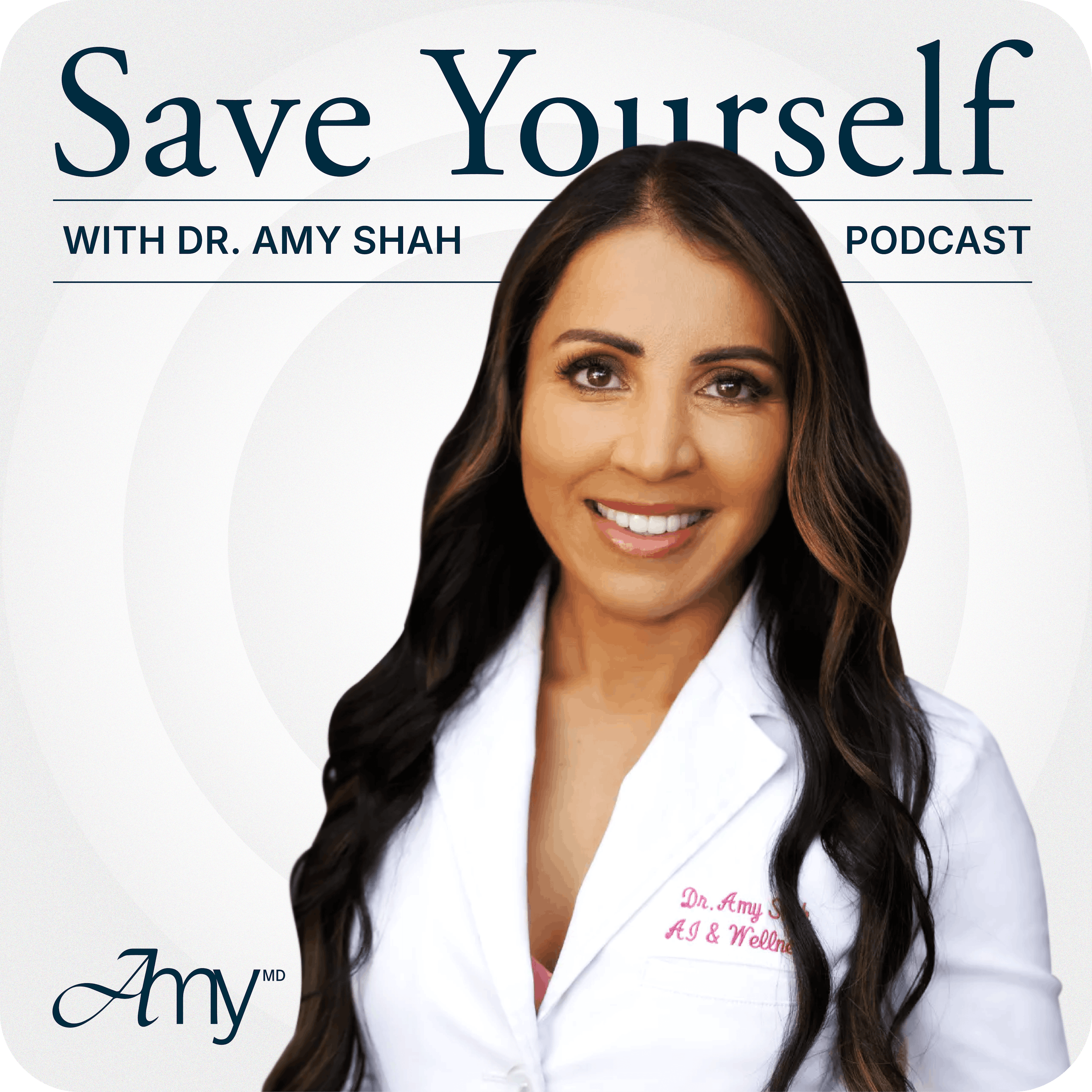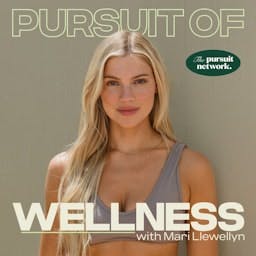.jpg)
Mindfully Integrative Show
Welcome to the Mindfully Integrative Podcast! We are dedicated to featuring inspirational and successful individuals who have embraced mindful investing to achieve optimal integrative wellness. Our podcast dives into all aspects of mindfully incorporating integrative functional health into our lives, aiming to help create a more balanced and fulfilling life. New episodes are released every Friday and cover a wide range of informative and entertaining topics, interviews, and discussions.
We explore a mindful approach to the mind-body connection with guests discussing various topics in integrative holistic health. This includes areas such as whole health, functional medicine, spiritual health, financial health, mental health, lifestyle health, mindset shifts, physical health, digital health, nutrition, gut health, sexual health, body positivity, family health, pet health, business health, and life purpose, among others.
Dr. Damaris G. is an Integrative Doctor of Nursing Practice, a Family Nurse Practitioner, a mom, and a veteran. For collaboration, interviews, or to say hi, you can contact her via email at damaris@mindfullyintegrative.com. You can also find her on LinkedIn at or https://www.linkedin.com/in/damarisdnp/. To join our membership and access resources, visit our website at https://mindfullyintegrative.com .
Please note that the information shared here is for informational and educational purposes only and should not be considered medical advice. Always consult with a physician or other licensed healthcare provider when making healthcare decisions. Enjoy the podcast!
Mindfully Integrative Show
Unlocking the Health Secrets of Betaine: A Nutritional Powerhouse for Liver Support and Inflammation Reduction
Discover the unsung hero of nutritional supplements—betaine. As I, Damaris Murray Grossman, unravel the mysteries of this essential nutrient on the Mindfully Integrative podcast, you'll be surprised at the array of health benefits it packs. Betaine is not merely a liver booster; it's a crusader against chronic inflammation, a supporter of cellular regeneration, and a key player in the metabolism of homocysteine, an amino acid that, when imbalanced, can lead to serious health issues such as diabetes and heart disease. But our conversation doesn't stop there; we also examine how betaine can be a game-changer for digestive wellness, potentially easing discomforts like GERD and acid reflux by regulating stomach acid levels.
Feast on knowledge as we reveal how to harness the power of betaine through natural sources like spinach, beets, and sauerkraut, and why a nutrient-rich diet is crucial for overcoming deficiencies common in the standard American diet. Throughout the episode, I share valuable insights and recommendations for those seeking to elevate their health through mindful eating. So if you're ready to boost your well-being and learn how to integrate betaine into your lifestyle for peak health and vitality, tune in to this eye-opening discussion. Your body—and especially your liver—will thank you for it.
Sponsor Affiliates
Empowering Your Health
Get YOUR Own
Joburg Protein Snacks
Discount Code: Damaris15 Or Damaris18
Feeling need to Lose Weight & Become metabolically Healthy
GET METABOLIC COURSE GLP 1 REseT
This course is designed for individuals looking to optimize their metabolic health through integrative and functional medicine approaches. Whether you're on a GLP-1 medication or seeking natural ways to enhance your metabolic function, this course provides actionable steps, expert insights, and a personalized roadmap sustainable wellness.
Are you feeling stressed, tired, or Metabolism imbalanced?
Take advantage of our free mindful steps to help improve your well-being.
ENJOY ONE OF our Books
Mindful Ways Health Wealth & Life
https://stan.store/Mindfullyintegrative
Join Yearly membership ALL IN ONE FUNCTION HEALTH
Ask Us for help...
Hi, how are you? This is Damaris Murray Grossman and this is Mindfully Integrative, and today we're talking about betaine, which is a source of antioxidant and mineral, and so I'm doing a series on vitamins, minerals and amino acids and nutritional needs that your body may need. So this vitamin-like nutrition helps with making more choline and betaine is used for developing and increasing more liver function, cellular regeneration, cellular division with that and carnitine production would help with prevention of chronic disease inflammatory process, and it's originally used in the body to. This amino acid is used for um homocysteine um process, so that it does not um cause inflammatory um condition, and homocysteine is a indicator for showing um, an inflammation within the body. It's usually used for treating homocystinuria, which is increased homocysteine within the blood or the urine, and it's the betatine it helps lower that. It helps lower this condition because when it's finally been approved that it's, usually it shows high level in the urine individuals. When they have this high level in the urine, the, it shows that there's a chronic um inflammatory process, either in the kidneys, either they have diabetes, they have cardiac disease and other inflammatory markers in liver disease, things, things of that nature. And it helps with, you know, breaking up and metabolizing things, especially if someone has, like fatty liver, metabolic health problems, and you know it's pretty useful. So it's one that can be used Now first off, like I say, with anything else, instead of a supplement. You know what are you putting in your body and how do you get this source. So it's big benefits. It's like anti-inflammatory antioxidant. So it's really going to help you get to get that inflammatory process, the bad inflammation within that's causing that chronic disease, whether it's cardiac, whether it's inflammatory in the stomach, whether it's inflammatory in the kidneys or just circulatory throughout, causing you some discomfort. It will also help with the stomach acid within the body. Usually there's a lot of GERD reflux. Usually there's a lot of GERD reflux.
Speaker 1:Betatine support is usually helping with those individuals that have either high or low. You know you obviously want to make sure that that's at the right level. Some people think that when they have reflux that it's actually due to too high acidity and actually it's probably because they have too low stomach acid or very high amounts of stress and they may not be digesting protein properly. So you know it's called betatine hydrochloride. You know that can cause that's what's actually, if it's not at the right level, maybe causing people some stomach problems. So you know that has to be looked into.
Speaker 1:And then also some anything else that's underlying, you know, if you put in the right foods in your body. But you know, still see, you know, is there a peptic ulcer? Is it H pylori? Is there, you know, low acid, which is the hypochloridia? Is there some sort of small intestinal bacterial overgrowth? Is there canadilla? Is there a mold or infection there? That you might not know of?
Speaker 1:But you know the betaine can be found in foods and the food sources that you can find it are in spinach beets, like a sauerkraut. If you want to do you, just made it, heat it up in a salad. You know, make it up in a salad. Any sort of bone broth, sweet potato, fish, beef liver, mushrooms. I enjoy doing mushroom blends or green blends because you know that will give you more options for inflammatory options. You know, granted, you know not that those are the solutions, but you know they will help lower and modulate the inflammatory process within the body. So there's some good mushroom blends for immunity and for inflammation and there's some good green pack that I would recommend.
Speaker 1:Not that, you know, I think that you have to take it, but it's just as an option, especially because the individuals in our standard American diet do not get enough nutritional value and nutritional needs. So that's why I recommend it. So that's the benefit of each. It's not something that you absolutely have to have, but it's just something that I recommend. Now, the only thing I would say those that cannot have this kind of betaine it has to make sure that they don't have severe peptic ulcer problems or have had been a drinking alcoholic or stomach cancer.
Speaker 1:Then this has to be avoided because it can actually increase your stomach acid. So we want to make sure that this is regulated properly and you're being seen by the professional, so you know it's important, but just like anything else, it has to be in balance. And then any individual that's breastfeeding or pregnant, I wouldn't recommend. You know, because you're ready when you're pregnant. If you know or know a family member that's been, you're already going to have that upset stomach because you already have the baby pushing up on the belly, so it's going to cause even more upset stomach. So that's not one that's recommended. If you have any other questions, reach out to me and I'll talk with you soon. Have a great day.
Podcasts we love
Check out these other fine podcasts recommended by us, not an algorithm.

The Dr. Hyman Show
Dr. Mark Hyman
Functional Fertility with Dr. Kalea Wattles
Kalea Wattles
On Health for Women
Aviva Romm
Save Yourself With Dr. Amy Shah
Dr. Amy Shah
Huberman Lab
Scicomm Media
The Peter Attia Drive
Peter Attia, MD
The Metabolic Classroom with Dr. Ben Bikman
Insulin IQ
FoundMyFitness
Rhonda Patrick, Ph.D.
Change Your Brain Every Day
Dr Daniel & Tana Amen
The Dr. Josh Axe Show
Dr. Josh Axe
Pursuit of Wellness
Mari Llewellyn & Pursuit Network
Feel Better, Live More with Dr Rangan Chatterjee
Dr Rangan Chatterjee: GP & Author
The Level Up Podcast w/ Paul Alex
Paul Alex Espinoza
Faith Over Fear
Jennifer Slattery, Faith Over Fear Author and Speaker
